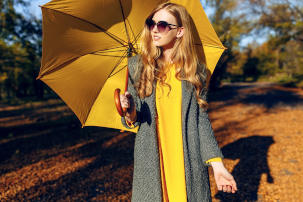 Sun protection is usually associated with the summer season. Nothing could be further from the truth! We are expo-sed to UV radiation every day, all year round. Exposing our eyes to excessive ultraviolet radiation has negative effects.
Sun protection is usually associated with the summer season. Nothing could be further from the truth! We are expo-sed to UV radiation every day, all year round. Exposing our eyes to excessive ultraviolet radiation has negative effects.
It is true that the effects of sunlight are more noticeable in the summer, yet sunglasses should be an integral part of every outfit, including the winter ones.
What should we pay attention to when choosing sunglasses?
- Shape and size – sunglasses should protect the whole surface of the eyes against UV radiation, which may reach the eyes from various sides, e.g. from underneath the glasses during water activities.
- Lens colour and tint percentage – there are various colours available on the market, from pink to yellow or black. The tint percentage should be selected individually according to the buyer’s preferences. What needs to be taken into account before the purchase is the amount of time spent in the sun, the intensity of solar radiation and the environment in which we stay (e.g. mountains, beach, etc.).
- Model – the sunglasses that we choose have to be comfortable enough for us to forget that we are wearing them. A wide range of models (e.g. cat eye) makes it easy to find the one that fits best our face shape.
- Filter– remember that the sunglasses should have filters such as UVA and UVB 400, as well as the required European Union certificates. Additionally, it is worth paying attention to filter categories, marked with numbers from 0 to 4. The higher the number, the lower the light transmittance.
- Polarisation – helps to eliminate reflected glare and thus facilitates everyday functioning. Polarised lenses are recommended not only to drivers and sportspeople, but also to all those who want to see better while wearing sunglasses.
- Brand – buy sunglasses from a reliable manufacturer, e.g. at an optical salon. Glasses of unknown origin may only have tinted lenses, which is not equivalent to having appropriate filters.
Sun protection following laser vision correction
According to the post-operative guidelines, for patients after laser vision correction it is impe-rative to protect the eyes against UV radiation and factors such as dust, pollen and wind for the first 3-4 weeks after the procedure.
Following the laser vision correction surgery, it is common to experience slightly higher photosensitivity, not only in the case of sunlight, so wearing sunglasses may prove helpful both outdoors and indoors (for the first few days at most, depending on the correction method, applied during the procedure.
Wstecz

 Sun protection is usually associated with the summer season. Nothing could be further from the truth! We are expo-sed to UV radiation every day, all year round. Exposing our eyes to excessive ultraviolet radiation has negative effects.
Sun protection is usually associated with the summer season. Nothing could be further from the truth! We are expo-sed to UV radiation every day, all year round. Exposing our eyes to excessive ultraviolet radiation has negative effects.